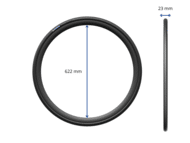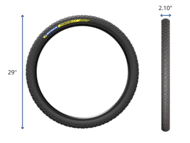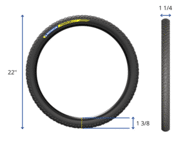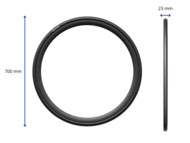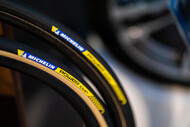
12" | ||
ETRTO | INCHES | MM |
47-203 | 12 x 1.75 | - |
- | 12 x 1.90 | - |
- | 12 1/2 x 1.75 | - |
- | 12 1/2 x 1.90 | - |
50-203 | 12 x 2.00 | - |
54-203 | 12 x 1.95 | - |
57-203 | 12 1/2 x 2 1/4 | - |
62-203 | 12 1/2 x 2 1/4 | - |
14" | ||
ETRTO | INCHES | MM |
47-254 | 14 x 1.75 | - |
- | 14 x 1.90 | - |
50-254 | 14 x 2.00 | - |
40-279 | 14 x 1 1/2 | 350 x 38B |
37-288 | 14 x 1 3/8 | 350 x 351 |
- | 14 x 1 5/8 x 1 3/8 | - |
40-288 | 14 x 1 5/8 | 350 x 38A |
44-288 | 14 x 1 5/8 x 1 3/8 | 350 x 42A |
47-288 | 14 x 1.75 | - |
32-298 | 14 x 1 1/4 | 350 x 32A |
16" | ||
ETRTO | INCHES | MM |
40-305 | 16 x 1.5 | - |
47-305 | 16 x 1.75 | - |
- | 16 x 1.90 | - |
50-305 | 16 x 2.00 | - |
54-305 | 16 x 1.95 | - |
- | 16 x 2.00 | - |
57-305 | 16 x 2.125 | - |
40-330 | 16 x 1 1/2 | 400 x 38B |
28-340 | - | 400 x 30A |
32-340 | 16 x 1 3/8 x 1 1/4 | 400 x 32A |
37-340 | 16 x 1 3/8 | 400 x 35A |
44-340 | 16 x 1 5/8 | - |
28-349 | 16 x 1 1/8 | - |
30-349 | 16 x 1.20 | - |
32-349 | 16 x 1 1/4 | - |
- | 16 x 1.25 | - |
35-349 | 16 x 1.35 | - |
37-349 | 16 x 1 3/8 | - |
17" | ||
ETRTO | INCHES | MM |
32-357 | 17 x 1 1/4 | - |
32-369 | 17 x 1 1/4 | - |
18" | ||
ETRTO | INCHES | MM |
28-355 | 18 x 1 1/8 | - |
32-355 | 18 x 1.25 | - |
35-355 | 18 x 1.35 | - |
40-355 | 18 x 1.50 | - |
42-355 | 18 x 1.60 | - |
47-355 | 18 x 1.75 | - |
- | 18 x 1.90 | - |
50-355 | 18 x 2.00 | - |
37-387 | 18 x 1 1/2 | - |
28-390 | 18 x 1 1/8 | 450 x 28A |
37-390 | 18 x 1 3/8 | 450 x 35A |
55-390 | - | 450 x 55A |
57-390 | - | 450 x 55A |
37-400 | 18 x 1 3/8 | - |
20" | ||
ETRTO | INCHES | MM |
54-400 | 20 x 2 x 1 3/4 | - |
23-406 | 20 x 0.90 | - |
25-406 | 20 x 1.00 | - |
28-406 | 20 x 1.10 | - |
- | 20 x 1 1/8 | - |
32-406 | 20 x 1.25 | - |
35-406 | 20 x 1.35 | - |
37-406 | 20 x 1.40 | - |
- | 20 x 1 3/8 | - |
40-406 | 20 x 1.50 | - |
42-406 | 20 x 1.60 | - |
44-406 | 20 x 1.50 | - |
- | 20 x 1.625 | - |
47-406 | 20 x 1.75 | - |
- | 20 x 1.90 | - |
50-406 | 20 x 2.00 | - |
54-406 | 20 x 2.10 | - |
- | 20 x 2.00 | - |
55-406 | 20 x 2.15 | - |
57-406 | 20 x 2.25 | - |
- | 20 x 2.125 | - |
60-406 | 20 x 2.35 | - |
54-428 | 20 x 2.00 | - |
40-432 | 20 x 1 1/2 | - |
37-438 | 20 x 1 3/8 | - |
40-438 | 20 x 1 3/8 x 1 1/2 | - |
28-440 | - | 500 x 28A |
37-440 | - | 500 x 35A |
40-440 | 20 x 1 1/2 | 500 x 38A |
23-451 | 20 x 0.90 | - |
- | 20 x 7/8 | - |
25-451 | 20 x 1.00 | - |
28-451 | 20 x 1 1/8 | - |
37-451 | 20 x 1 3/8 | - |
22" | ||
ETRTO | INCHES | MM |
50-489 | 22 x 2.00 | - |
28-490 | - | 500 x 28A |
32-490 | 22 x 1 3/8 x 1 1/4 | 550 x 32A |
37-490 | 22 x 1 3/8 | 550 x 35A |
47-498 | 22 x 1 3/8 x 1 1/4 | - |
25-501 | 22 x 1.00 B.S | - |
32-501 | 22 x 1 1/4 | - |
37-501 | 22 x 1 1/4 | - |
24" | ||
ETRTO | INCHES | MM |
40-507 | 24 x 1.50 | - |
44-507 | 24 x 1.625 | - |
- | 24 x 1.75 | - |
47-507 | 24 x 1.75 | - |
- | 24 x 1.85 | - |
- | 24 x 1.90 | - |
50-507 | 24 x 2.00 | - |
- | 24 x 1.90 | - |
- | 24 x 2.125 | - |
54-507 | 24 x 2.10 | - |
55-507 | 24 x 2.15 | - |
57-507 | 24 x 2.25 | - |
- | 24 x 2.125 | - |
60-507 | 24 x 2.35 | - |
62-507 | 24 x 2.40 | - |
23-520 | 24 x 0.90 | - |
- | 24 x 7/8 | - |
44-531 | 24 x 1 5/8 x 1 1/2 | - |
40-534 | 24 x 1 1/2 | - |
20-540 | 24 x 3/4 | - |
23-540 | 24 x 0.90 | - |
- | 24 x 7/8 | - |
25-540 | 24 x 1.00 | - |
30-540 | 24 x 1.20 | - |
32-540 | 24 x 1 3/8 x 1 1/4 | - |
37-540 | 24 x 1 3/8 | - |
40-540 | 24 x 1 3/8 x 1 1/2 | - |
22-541 | - | - |
25-541 | - | 600 x 25A |
28-541 | - | 600 x 28A |
32-541 | 24 x 1 3/8 x 1 1/4 NL | 600 x 32A |
37-541 | - | 600 x 35A |
26" | ||
ETRTO | INCHES | MM |
20-559 | - | - |
23-559 | 26 x 0.90 | - |
- | 26 x 7/8 | - |
25-559 | 26 x 1.00 | - |
28-559 | 26 x 1.10 | - |
30-559 | 26 x 1.20 | - |
32-559 | 26 x 1.25 | - |
35-559 | 26 x 1.35 | - |
37-559 | 26 x 1.40 | - |
- | 26 x 1 5/8 x 1 3/8 | - |
40-559 | 26 x 1.50 | - |
42-559 | 26 x 1.60 | - |
44-559 | 26 x 1.625 | - |
44-559 | 26 x 1.75 | - |
47-559 | 26 x 1.75 | - |
- | 26 x 1.80 | - |
- | 26 x 1.85 | - |
- | 26 x 1.90 | - |
- | 26 x 2.00 | - |
50-559 | 26 x 2.00 | - |
- | 26 x 1.90 | - |
- | 26 x 1.95 | - |
52-559 | 26 x 2.00 | - |
54-559 | 26 x 2.10 | - |
- | 26 x 1.95 | - |
- | 26 x 2.125 | - |
57-559 | 26 x 2.25 | - |
- | 26 x 2.125 | - |
- | 26 x 2.20 | - |
58-559 | 26 x 2.35 | - |
62-559 | 26 x 2.40 | - |
- | 26 x 2.50 | - |
64-559 | 26 x 2.50 | - |
65-559 | 26 x 2.60 | - |
70-559 | 26 x 2.75 | - |
75-559 | 26 x 3.00 | - |
95-559 | 26 x 3.70 | - |
- | 26 x 3.80 | - |
100-559 | 26 x 4.00 | - |
115-559 | 26 x 4.50 | - |
120-559 | 26 x 4.80 | - |
20-571 | 26 x 3/4 | - |
23-571 | 26 x 7/8 | 650 x 23C |
40-571 | 26 x 1 1/2 CS | 650 x 38C |
- | 26 x 1 3/8 x 1 1/2 NL | - |
47-571 | 26 x 1 3/4 | 650 x 45C |
- | - | 650 CS Confort |
54-571 | 26 x 2 x 1 3/4 | 650 x 50C |
20-590 | 26 x 3/4 | 650 x 20A |
25-590 | 26 x 1.00 | 650 x 25A |
28-590 | 26 x 1 3/8 x 1 1/8 | 650 x 28A |
32-590 | 26 x 1 3/8 x 1 1/4 | 650 x 32A |
37-590 | 26 x 1 3/8 | 650 x 35A |
40-590 | 26 x 1.50 | 650 x 38A |
- | 26 x 1 3/8 x 1 1/2 | - |
42-590 | 26 x 1 5/8 | 650 x 40A |
32-597 | 26 x 1 1/4 | - |
27" | ||
ETRTO | INCHES | MM |
40-609 | 27 x 1 1/2 | - |
20-630 | 27 x 3/4 | - |
22-630 | 27 x 7/8 | - |
25-630 | 27 x 1.00 | - |
- | 27 x 1 1/16 | - |
28-630 | 27 x 1 1/8 | - |
32-630 | 27 x 1 1/4 | - |
35-630 | 27 x 1 3/8 | - |
27,5" | ||
ETRTO | INCHES | MM |
28-584 | 26 x 1 1/8 x 1 1/2 | 650 x 28B |
32-584 | - | 650 x 32B |
35-584 | 27.5 x 1.35 | 650B |
- | 26 x 1 3/8 x 1 1/2 | 650 x 35B |
37-584 | 27.5 x 1.40 | 650B |
- | 26 x 1 1/2 x 1 3/8 | 650 x 35B |
- | - | 650 Standard |
40-584 | 27.5 x 1.50 | 650B |
- | 26 x 1 5/8 x 1 1/2 | 650 x 38B |
44-584 | 27.5 x 1.65 | 650B |
- | 26 x 1 5/8 x 1 2/2 | 650 x 42B |
- | - | 650B Semi-Confort |
- | - | 650B 1/2 Ballon |
50-584 | 27.5 x 1.75 | 650B |
52-584 | 27.5 x 2.00 | 650B |
54-584 | 27.5 x 2.00 | 650B |
- | 27.5 x 2.10 | - |
55-584 | 26 x 1 1/2 x 2 | 650B |
58-584 | 27.5 x 2.25 | 650B |
61-584 | 27.5 x 2.35 | 650B |
64-584 | 27.5 x 2.40 | 650B |
66-584 | 27.5 x 2.50 | 650B |
70-584 | 27.5 x 2.60 | 650B |
71-584 | 27.5 x 2.75 | 650B |
74-584 | 27.5 x 2.80 | 650B |
75-584 | 27.5 x 2.90 | 650B |
- | 27.5 x 3.00 | -7,5 |
28" | ||
ETRTO | INCHES | MM |
18-622 | 28 x 3/4 | 700 x 18C |
19-622 | - | 700 x 19C |
- | - | 700 x 19 |
20-622 | 28 x 3/4 | 700 x 20C |
22-622 | 28 x 7/8 | 700 x 22C |
- | - | 700 x 22 |
23-622 | 28 x 0.90 | 700 x 23C |
- | 28 x 7/8 | - |
24-622 | - | 700 x 24C |
25-622 | 28 x 1.00 | 700 x 25C |
- | 28 x 1 1/16 | - |
26-622 | - | 700 x 26C |
28-622 | 28 x 1.10 | 700 x 28C |
- | 28 x 1 5/8 x 1 1/8 | - |
30-622 | 28 x 1.20 | 700 x 30C |
32-622 | 28 x 1.25 | 700 x 32C |
- | 28 x 1 5/8 x 1 1/4 | - |
33-622 | 28 x 1.30 | 700 x 33C |
35-622 | 28 x 1.35 | 700 x 35C |
37-622 | 28 x 1.40 | 700 x 35C |
- | 28 x 1 5/8 x 1 3/8 | - |
40-622 | 28 x 1.50 | 700 x 38C |
- | 28 x 1 5/8 x 1 1/2 | - |
42-622 | 28 x 1.60 | 700 x 40C |
44-622 | 28 x 1.625 | 700 x 42C |
47-622 | 28 x 1.75 |
|
50-622 | 28 x 2.00 | - |
- | 29 x 2.00 | - |
- | 28 x 1.90 | - |
55-622 | 28 x 2.15 | - |
- | 29 x 2.15 | - |
60-622 | 28 x 2.35 | - |
- | 29 x 2.35 | - |
32-635 | 28 x 1 1/2 x 1 1/8 | 770 x 28B |
- | - | 700 x 28B |
- | - | 700B Course |
40-635 | 28 x 1 1/2 | 700 x 38B |
- | 28 x 1 1/2 x 1 5/8 | 700B Standard |
44-635 | 28 x 1 5/8 x 1 1/2 | 700 x 42B |
28-642 | 28 x 1 5/8 x 1 1/2 | 700 x 28A |
37-624 | 28 x 1 3/8 | 700 x 35A |
29" | ||
ETRTO | INCHES | MM |
50-622 | 29 x 2.00 | - |
52-622 | 29 x 2.00 | - |
- | 28 x 2.00 | - |
54-622 | 29 x 2.10 | - |
- | 28 x 2.10 | - |
55-622 | 29 x 2.15 | - |
- | 28 x 2.15 | - |
55-622 | 29 x 2.25 | - |
58-622 | 29 x 2.35 | - |
61-622 | 29 x 2.40 | - |
- | 28 x 2.35 | - |
75-622 | 29 x 3.00 | - |


